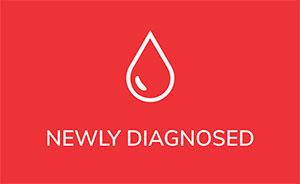We have to know our enemy before we decide how to best target therapy. That is why performing certain biomarker testing before considering any type of CLL treatment is critical, and why it is tragic when it is not being done.
At ASH 2018, I interviewed Dr. Anthony Mato, a CLL expert at Memorial Sloane Kettering in New York City, about his research on what was happening in terms of biomarker testing on CLL patients in the real-world setting. Dr. Mato and I discussed his research with two different registries including the new research findings that he presented at ASH 2018.
Connect CLL looked at 199 medical US centers between 2010-2014 before the era of novel agents. The new drug approvals really ushered in the need to perform predictive biomarker testing in CLL, as we had clear evidence that novel treatments were dramatically better for certain patients with specific biomarkers.
The second registry was InformCLL which gathered data from 150 centers (96% community, 4% academic) between 2015-18 when the value of predictive testing to support therapy choices was well established.
One would think that in recent years, appropriate biomarker testing would be more common. But in fact, the number of patients receiving the necessary testing prior to receiving treatment has unfortunately fallen.
The three biomarker tests that MUST be performed prior to starting any form of CLL treatment are:
- FISH (fluorescence in situ hybridization) that looks inside the CLL cells for chromosome abnormalities. Especially important is the finding of a deletion of the short arm of the 17th chromosome or del(17p) that strongly predicts poor response to chemotherapy.
- Testing for mutations in TP53. TP53 is the gene on the short arm of the 17th chromosome that helps chemo to work and suppress cancer growth. If it’s missing as in del(17p) or mutated as discovered by genetic testing, generally chemotherapy will not work.
- IGVH mutation status is the third test and helps predict one’s chances of having a durable response to chemo. Unmutated IGVH (U-CLL) patients generally have a shorter time to disease progression.
The first two tests must be done before the first and any subsequent treatments as they can change over time, usually for the worse. IGVH mutation status is nearly always stable over time, so it only needs to be performed once.
Takeaways:
- Testing
- Connect CLL registry showed less than 2/3 of patients had FISH testing, and 6% had IGVH testing, performed prior to their first CLL-directed treatment
- Only 40% had repeat FISH testing prior to a subsequent CLL therapy.
- InformCLL registry examined the data on 840 pts (459 who were previously untreated; and 381 who were relapsed or refractory to a prior treatment).
- Among all patients (N=840), 262 (31%) had FISH testing, 89 (11%) had biomarker testing performed for TP53 mutation, and 94 (11%) had testing for IGHV mutational status.
- In the 381 relapsed/refractory patients, the numbers were even worse. Only 98 (26%) had biomarker testing performed for FISH, 35 (9%) for TP53 mutation, and 39 (10%) for IGHV.
- Treatment
- Not only was the testing not being performed, but when it was performed the results were often not being used to best inform the type of CLL therapy the patient should receive.
- More than 1/3 of the 70 patients with del(17p) received chemotherapy or chemo-immunotherapy (CT/CIT), which will not work in those with these biomarker results.
- Of the 14 previously untreated patients with mutated TP53, (36%) received CT/CIT which is generally not indicated in those who have this mutation.
- Among 69 patients with unmutated IGVH, who have been proven to have much worse outcomes when CT/CIT is used as a treatment, 32 of the pts (46%) received CT/CIT.
- In 35 previously untreated pts with unmutated IGVH, CT/CIT was a more common treatment choice (n=20; 57%) than ibrutinib (n=13; 37%).
- Of the patients tested who had abnormalities such as del(17p) or TP53 mutation, approximately one-third still received CT/CIT.
Conclusions:
We have our work cut out for us surrounding both educating healthcare providers and patients on this issue. Not only are too few patients getting the biomarker testing they need, the trend is moving in the wrong direction which leads to poorer outcomes. Moreover, when CLL patients relapse and they especially need to have their biomarkers checked again, retesting is happening even less.
Finally, in the greatest tragedy that these results highlight, even when the appropriate testing is done, the results aren’t influencing therapy choices and patients are getting treatments that are not likely going to help them.
This is heartbreaking and needs to stop happening.
That is the exact reason why CLL Society launched the Test Before Treat campaign, as well as why our motto is Smart Patients Get Smart Care™.
Here is my interview with Dr. Anthony Mato:
Here is the link to the ASH 2018 abstract which provides more details.
If you have a Test Before Treat story to share, we want to hear from you. Please email us at [email protected]

















